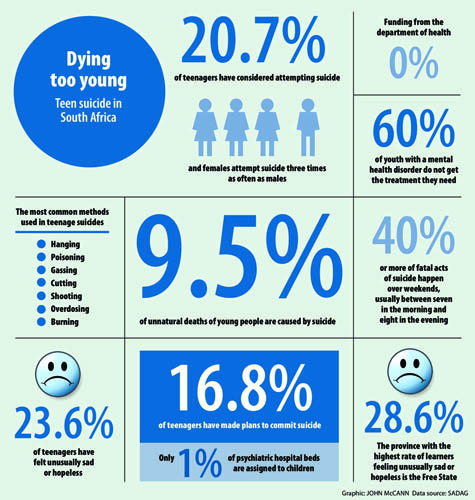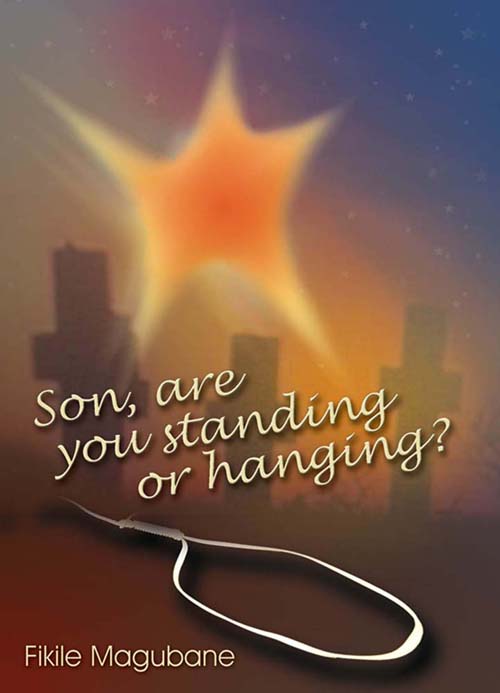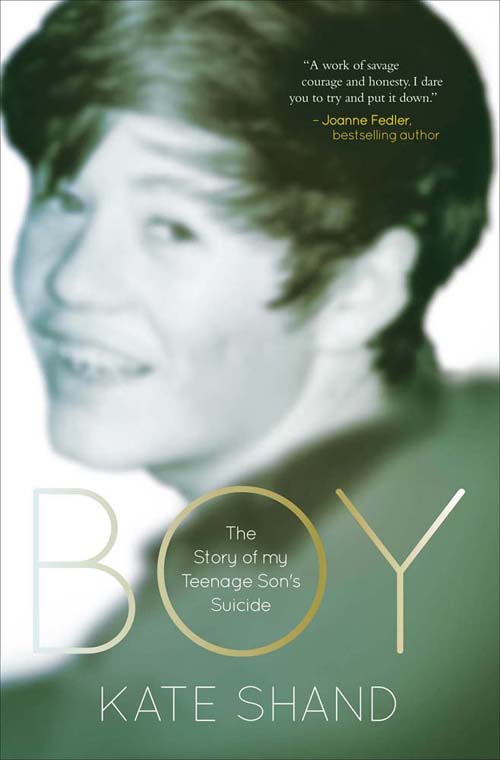Fikile Magubane was tired. It was 5am on a cold July morning and she had been up all night helping a woman in the community get help for her suicidal son.
She was relieved when the boy was finally admitted to hospital and she could go home to rest. Magubane phoned her son-in-law to fetch her. But as the car pulled into her driveway she was surprised to see a crowd of people outside her house.
"What do they want here?" Magubane asked herself. She recognised a number of relatives. She thought: "Maybe they have come to show support because it is my wedding anniversary."
Her husband had died four months earlier after a long illness.
But she felt uneasy. Something was wrong.
"Where's Nkanyezi?" she asked.
"Come in and sit down, Mama," said a relative.
"No. I don't want to sit down. I want my son," she said.
Then she noticed the A4 pages stuck to the wall. She looked closer. There were hand-drawn arrows pointing in one direction. She followed the arrows through the house to the outbuilding at the back.
There was a small note stuck on the door of the outbuilding with one word written on it: "Goodbye."
With an overwhelming sensation of fear and dread she opened the door and saw her 15-year-old son hanging from the ceiling, an extension cord around his neck.
12 years later
The image still haunts Magubane, nearly 12 years later.
"I never thought of committing suicide myself but I envied my husband because he didn't have to go through what I was going through," she tells me, sitting across the table at a coffee shop in Pretoria. "I thought he was better off where he was."
If Nkanyezi was alive today he would be 27 years old.
According to the South African Depression and Anxiety Group (Sadag), teenage suicide is on the rise.
"One in four South African youths have sad and hopeless feelings," according to the group's founder, Zane Wilson, "and one in five consider suicide. I've seen too many unnecessary deaths and it's because the government is not taking depression in youth seriously."
According to Sadag, 60% of youth with a mental health disorder do not get the treatment they need and only 1% of mental hospital beds are assigned to children. The group receives no funding from the health department for its programmes aimed at combating teenage suicide.
The health department's head of communication, Popo Maja, said it is easy to criticise and apportion blame to the government.
Maja said that at a summit held in April last year, which was attended by a number of stakeholders including Sadag, it was understood that "the responsibility [of suicide prevention was not] solely that of the government".
But, said Wilson, because of a lack of government funding into research, there is little clarity on the exact reasons for the rise in teenage suicide.
"There are numerous triggers and we're not 100% certain why suicide is on the increase but certainly unemployment, economic instability, violence, a lack of social cohesion, the breakdown of traditional family structures as well as school-related pressures and bullying can be cause for concern," she said.
Traumatic events
"When people ask me why Nkanyezi chose suicide I tell them he is the only one who knows," Magubane tells me. "I have learnt to live without these questions being answered. I can only make assumptions."
However, there were a number of traumatic events in Nkanyezi's childhood that Magubane thinks may have led to his depression.
"When Nkanyezi was four we were attacked by a group of men with AK47s," she says. "I remember him taking his belt and trying to help me fight these people."At the time Magubane was lecturing nursing at the University of KwaZulu-Natal's Pietermaritzburg campus.
"After the attack the university organised that we move from Mbali to a white suburb," she says. "This was before the Group Areas Act was repealed and people didn't want us there."
She believes Nkanyezi was "isolated" because "those people" didn't want their children "to play with a black child".
After the Magubane family moved, part of their house was gutted.
"We were told it was an electrical fault but we weren't sure if it might have been those people who attacked us in Mbali or the people who were against us living in that white neighbourhood," she said.
She believes that these and other events added up and Nkanyezi's father's death was the "trigger" for his suicide.
According to Sadag's Zane Wilson, "only through educating people across the country about the triggers, signs and symptoms and treatments for depression and suicide can we hope to get people talking and coming forward for help".
Education is important not only to give parents the tools to recognise suicidal behaviour in their children, but also to deal with a tragedy once it has happened.
Stigma
"There's a stigma against suicide," says Magubane. "After Nkanyezi passed someone came up to me and said: 'I pity your son.' I said: 'Which son are you talking about because my son has died?' "
"He said, 'I'm talking about that one. I pity him. He is rotting in hell because he killed himself'."
"I want to say to parents in this situation: don't be affected by those things. It shows people are ignorant about mental disease," she says. "After I found the body I called the police, but they took more than six hours to arrive."
She looks at me intently through her black-rimmed glasses from across the table. "When they finally came there were so many police vans it felt like they had come to fetch a criminal."
She frowns at the memory.
"I was in shock; it was like I was dreaming," she pinches her arm as if to test reality.
"I can't describe the pain," she says. "I wouldn't like anyone to experience the pain of losing a child."
A tear rolls down her left cheek. She takes off her glasses and reaches into the bosom of her bright pink top for a tissue. She has come here to tell me her story. She hopes it will save the life of someone else's son or daughter.
"I was angry," she says, her kind face racked with pain. "I'm such an open person. I would sit with my children and talk to them. Why couldn't he tell me?
"I was angry with God that I went to help somebody else because he says we must love one another, and when I come back my own son is hanging."
The steady eye contact she has maintained is broken as she looks down at her hand and gently strokes the gold wedding band on her ring finger. "I felt embarrassed and very ashamed that I hadn't played a role as a parent. It was like I had failed."
She quickly wipes away a second tear and looks up. "But then I said, 'No, no, no, Fikile, you did your best. You cannot punish yourself like this.'
"It was a tough journey," she says. "I was very depressed. I wanted my curtains drawn. I was comfortable with darkness more than light. I was comfortable with silence more than noise."
A look of stubborn conviction appears on her face. "I said to myself, even if I save one life I'm prepared to share my story. I'm prepared to shed those tears again and again as long as I know I'm going to save somebody."
___________________________________________________________________________________

Coping with life after death
Families can be torn apart after a loved one commits suicide, if they do not find support.
Losing a family member is traumatic and, because suicide can be difficult to understand, the family members left behind often find it difficult to cope.
There is a range of issues behind each incident. Popo Maja, the health department's head of communications, said that the main risk factors for teenage suicide are: the presence of mental disorders such as depression or schizophrenia; the presence of a chronic physical illness; substance abuse; availability of firearms; availability of lethal poisons; socioeconomic factors such as unemployment; sociodemographic factors such as separation and loss, bereavement, academic or vocational failures; and difficult family relations.
According to Johannesburg clinical psychologist Hlengy Zwane, children with mental disorders such as borderline personality disorder (which includes emotional instability), are more prone to suicide attempts.
"For these people it's a way of expressing emotion, a cry for help but they struggle to use words so they use actions," she said.
Zwane said that many children grow up with single parents. This can sometimes lead to attachment issues because they receive less attention. "They're in a world where they've never been validated and they might wonder what's the point of living because nobody really loved them," she said.
However, similar situations may apply in well-adjusted families.
"For example, in cities where people lead very busy lives, parents are extremely busy and may not be emotionally available to their children," said Zwane. "Children may reach out to their parents but because they are busy they may just throw money at the problem. This may make children feel that their parents don't actually care about their problems."
Traumatic events
There are also cases when children experience something new and they are unable to deal with because they have never encountered it before.
"This can happen to anybody," said Zwane. "Encountering a big problem such as divorce or surgery may cause them to fall into a deep and sudden depression because they have trouble adjusting to the new circumstances."
Traumatic events can lead to suicidal thoughts, which, said Zwane, "when you don't have the emotional capacity and the external support, can eventually lead to an attempt to take your life". It can be extremely difficult for a family to make peace with a loved one committing suicide.
"The grieving process is complex because the family is left with questions that can never be answered," said Zwane. "Could we have done something differently? Is it our fault? Wasn't I there for my sister? Did I not give my son enough love?"
Siblings may have new, unexpected roles to play, said Zwane.
A family that has just experienced a suicide is at high risk for another one, said Zwane. "Siblings might feel like they don't belong anymore or that it's wrong – why should they live when their brother of sister has left?
"The main thing is [to try to get the family members who are left behind] to understand that it is not their fault," she said. "When somebody commits suicide it's a decision they made, whether or not [the family] think they contributed. They need to accept this loss, seek help and speak to someone, because no matter what, they can't bring that person back."
Maja said recent studies indicate that the prevalence of mental health disorders is high and that vulnerability and associated risk factors are increasing. "A [mental health] action plan is being finalised in consultation with stakeholders and … resources will be reallocated to fund the priority activities," said Maja. "The answer is not more beds."
Currently, only 1% of state mental hospital beds are dedicated to children.
___________________________________________________________________________________
Warning signs to watch for
• Changes in your child's eating and sleeping habits such as trouble falling asleep and loss of appetite.
• Dramatic changes in your child's personality, for example sudden mood swings or deep sadness.
• Using drugs or alcohol.
• Risk-taking behaviour: when your teen places himself or herself in a dangerous situation.
• Writing poetry or drawing pictures about death and suicide, or a preoccupation with the idea of death, can be indicators of suicidal thoughts.
• Talking about suicide or about killing oneself.
• Giving valuable possessions away and putting affairs in order such as changing a will.
• Saying things like "The world hates me, I'm not going to be here for much longer", "It would be better if I wasn't here" or "I want out".
• Social withdrawal and loss of interest in activities and people that your child used to participate in and care about.
• A drop in your teen's personal hygiene such as not bathing regularly or wearing the same clothes for extended periods.
Sources: sadag.org and webmd.com. If you are, or someone you know is exhibiting any of these signs, call the South African Depression and Anxiety Group on 0800 21 22 23 or 0800 567 567 or SMS 31393.
___________________________________________________________________________________
Two mothers write about losing their children
 "Nkanyezi means star," says Fikile Magubane as she points to the book on her lap. On the cover there is a fading orange star. "It's not a bright star. It's a dying star: a star that's in pain." Magubane's Son, Are You Standing or Hanging? is a painful account of her son Nkanyezi's suicide at the age of 15.
"Nkanyezi means star," says Fikile Magubane as she points to the book on her lap. On the cover there is a fading orange star. "It's not a bright star. It's a dying star: a star that's in pain." Magubane's Son, Are You Standing or Hanging? is a painful account of her son Nkanyezi's suicide at the age of 15.
She says she felt compelled to write the book, and hopes it might help others to save their children from the same fate. Her new book, Help, which describes the roles that different sectors of society can play in combatting suicide, will be out next month.
Son, Are You Standing or Hanging? is published by Shuter & Shooter. Help will be published by Mym Publishers next month.
 As an excerpt of Kate Shand's book on the same subject reads: "I have a son my son is dead I had a son. It becomes a mantra and the words can drive a person mad." Boy: The Story of My Teenage Son's Suicide is a vivid and emotional account of Shand's experience of losing her son, John Peter. At 14, he hanged himself in his parents' house.
As an excerpt of Kate Shand's book on the same subject reads: "I have a son my son is dead I had a son. It becomes a mantra and the words can drive a person mad." Boy: The Story of My Teenage Son's Suicide is a vivid and emotional account of Shand's experience of losing her son, John Peter. At 14, he hanged himself in his parents' house.
"As much as I hope the book will help others, ultimately it forms a most important part of my healing and ongoing transformation," she says.
Boy is published by Jacana.
